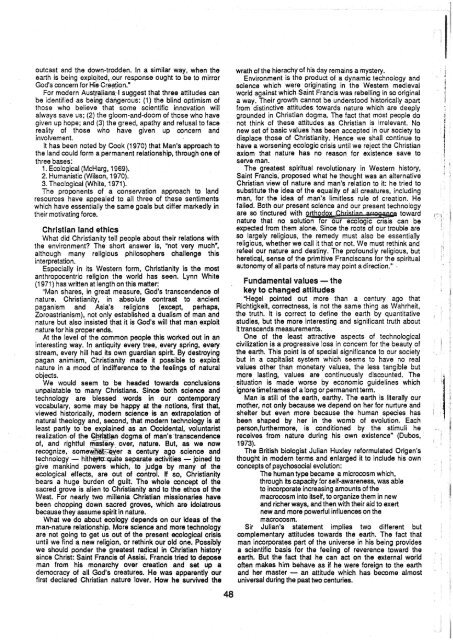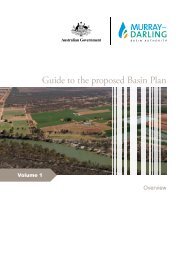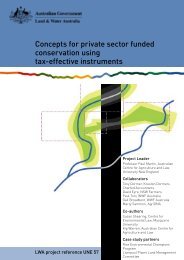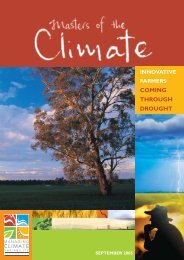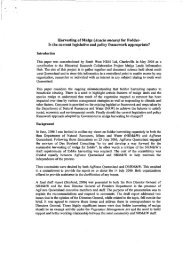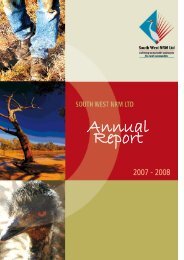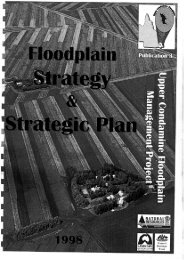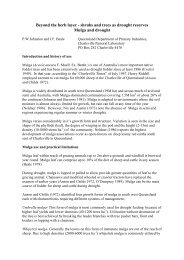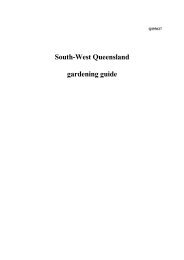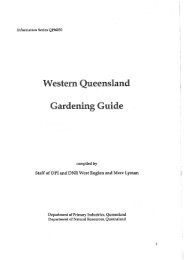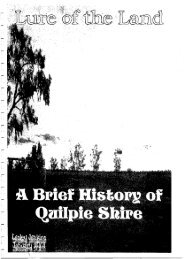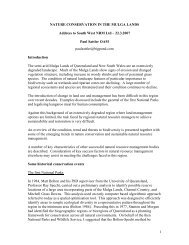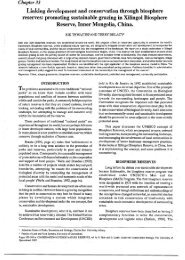soil-conservation-people-religion-and-land.pdf - South West NRM
soil-conservation-people-religion-and-land.pdf - South West NRM
soil-conservation-people-religion-and-land.pdf - South West NRM
You also want an ePaper? Increase the reach of your titles
YUMPU automatically turns print PDFs into web optimized ePapers that Google loves.
outcast <strong>and</strong> the down-trodden. In a similar way, when the<br />
earth is being exploited,-our response ought to be to mirror<br />
God's concern for HisCrt&ion."<br />
For modern Aust@iam:l suggest that three attitudes can<br />
be identified as being dangerous: (1) the blind optimism of<br />
those who believe that some scientific innovation will<br />
always save us; (2) the gloom-<strong>and</strong>-doom of those who have<br />
given up hope; <strong>and</strong> (3) the greed, apathy <strong>and</strong> refusal to face<br />
reality of those who have given up corlcern <strong>and</strong><br />
involvement.<br />
It has been noted by Cook (1 970) that Man's approach to<br />
the l<strong>and</strong> could form a permanent relationship, through one of<br />
three bases:<br />
1 . Ecological (McHarg, 1 969).<br />
2. Humanistic (Wilson, 1970).<br />
3. Theological (White, 1971).<br />
The proponents of a <strong>conservation</strong> approach to l<strong>and</strong><br />
resources have appealed to all three of these sentiments<br />
which have essentially the same goals but differ markedly in<br />
their motivating force.<br />
Christian l<strong>and</strong> ethics<br />
What did Christianity tell <strong>people</strong> about their relations with<br />
the environment? The short answer is, "not very much",<br />
although many religious philosophers challenge this<br />
interpretation.<br />
Es~ecialiv in its <strong>West</strong>ern form. Christianitv is the most<br />
anthropocentric <strong>religion</strong> the world has seen Lynn White<br />
(1971) has written at length on this matter:<br />
"Man shares, in great measure, God's transcendence of<br />
nature. Christianity, in absolute contrast to ancient<br />
paganism <strong>and</strong> Asia's <strong>religion</strong>s (except, perhaps,<br />
Zoroastrianism), not only established a dualism of man <strong>and</strong><br />
nature but also insisted that it is God's will that man exploit<br />
nature for his proper ends.<br />
At the level of the common <strong>people</strong> this worked out in an<br />
interesting way. In antiquity every tree, every spring, every<br />
stream, every hill had its own guardian spirit. By destroying<br />
pagan animism, Christianity made it possible to exploit<br />
nature in a mood of indifference to the feelings of natural<br />
objects.<br />
We would seem to be headed towards conclusions<br />
unpalatable to many Christians. Since both science <strong>and</strong><br />
technology are blessed words in our contemporary<br />
vocabulary, some may be happy at the notions, first that,<br />
viewed historically, modern science is an extrapolation of<br />
natural theology <strong>and</strong>, second, that modern technology is at<br />
least partly to be explained as an Occidental, voluntarist<br />
realization of the C&@@n dogma of man's transcendence<br />
of, <strong>and</strong> rightful rfkste-y- over, nature. But, as we now<br />
recognize, somewf%iESyer<br />
a century ago science <strong>and</strong><br />
technology - hithe@qute separate activities - joined to<br />
give mankind powers which, to judge by many of the<br />
ecological effects, are out of control. If so, Christianity<br />
bears a huge burden of guilt. The whole concept of the<br />
sacred grove is alien to Christianity <strong>and</strong> to the ethos of the<br />
<strong>West</strong>. For nearly two millenia Christian missionaries have<br />
been chopping down sacred groves, which are idolatrous<br />
because they assume spirit in nature.<br />
What we do about ecology depends on our ideas of the<br />
man-nature relationship. More science <strong>and</strong> more technology<br />
are not going to get us out of the present ecological crisis<br />
until we find a new <strong>religion</strong>, or rethink our old one. Possibly<br />
we should ponder the greatest radical in Christian history<br />
since Christ: Saint Francis of Assisi. Francis tried to depose<br />
man from his monarchy over creation <strong>and</strong> set up a<br />
democracy of all God's creatures. He was apparently our<br />
first declared Christian nature lover. How he survived the<br />
wrath of the hierachy of his day remains a mystery.<br />
Environment is the product of a dynamic technology <strong>and</strong><br />
science which were originating in the <strong>West</strong>ern medieval<br />
world against which Saint Francis was rebelling in so original<br />
a way. Their growth cannot be understood historically apart<br />
from distinctive attitudes towards nature which are deeply<br />
grounded in Christian dogma. The fact that most <strong>people</strong> do<br />
not think of these attitudes as Christian is irrelevant. No<br />
new set of basic values has been accepted in our society to<br />
displace those of Christianity. Hence we shall continue to<br />
have a worsening ecologic crisis until we reject the Christian<br />
axiom that nature has no reason for existence save to<br />
serve man.<br />
The greatest spiritual revolutionary in <strong>West</strong>ern history,<br />
Saint Francis, proposed what he thought was an alternative<br />
Christian view of nature <strong>and</strong> man's relation to it: he tried to<br />
substitute the idea of the equality of all creatures, including<br />
man, for the idea of man's limitless rule of creation. He<br />
failed. Both our prese<br />
are so tinctured with<br />
nature that no solut~o<br />
expected from them a<br />
so largely religious, the remedy must also be essentially<br />
religious, whether we call it that or not. We must rethink <strong>and</strong><br />
refeel our nature <strong>and</strong> destiny. The profoundly religious, but<br />
heretical, sense of the primitive Franciscans for the spiritual<br />
autonomy of all parts of nature may point a direction." .<br />
Fundamental values - the<br />
key to changed attitudes<br />
"Hegel pointed out more than a century ago that<br />
Richtigkeit, correctness, is not the same thing as Wahrheit,<br />
the truth. It is correct to define the earth by quantitative<br />
studies, but the more interesting <strong>and</strong> significant truth about<br />
it transcends measurements.<br />
One of the least attractive aspects of technological<br />
civilization is a progressive loss in concern for the beauty of<br />
the earth. This point is of special significance to our society<br />
but in a capitalist system which seems to have no real<br />
values other than monetary values, the less tangible but<br />
more lasting, values are continuously dismunted. The<br />
situation is made worse by economic guidelines which<br />
ignore timeframes of a long or permanent term.<br />
Man is still of the earth, earthy. The earth is literally our<br />
mother, not only because we depend on her for nurture <strong>and</strong><br />
shelter but even more because the human species has<br />
been shaped by her in the womb of evolution. Each<br />
person,furthermore, is conditioned by the stimuli he<br />
receives from nature during his own existence" (Dubos,<br />
1973).<br />
The British biologist Julian Huxley reformulated Origen's<br />
thought in modern terms <strong>and</strong> enlarged it to include his own<br />
concepts of psychosocial evolution:<br />
The human type became a microcosm which,<br />
through its capacity :or self-awareness, was able<br />
to incorporate increasing amounts of the<br />
macrocosm into itself, to organize them in new<br />
<strong>and</strong> richer ways, <strong>and</strong> then with their aid to exert<br />
new <strong>and</strong> more powerful influences on the<br />
macrocosm.<br />
Sir Julian's statement implies two different but<br />
complementary attitudes towards the earth. The fact that<br />
man incorporates part of the universe in his being provides<br />
a scientific basis for the feeling of reverence toward the<br />
earth. But the fact that he can act on the external world<br />
often makes him behave as if he were foreign to the earth<br />
<strong>and</strong> her master - an attitude which has become almost<br />
universal during the past two centuries.<br />
a


